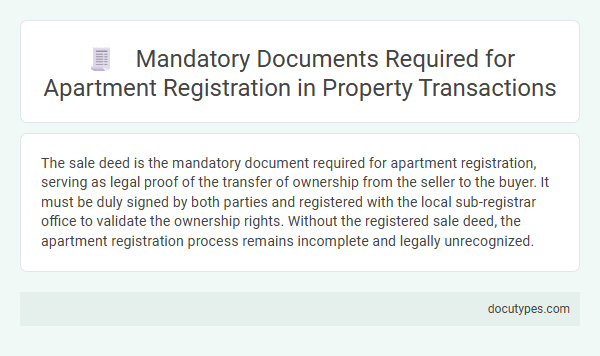The sale deed is the mandatory document required for apartment registration, serving as legal proof of the transfer of ownership from the seller to the buyer. It must be duly signed by both parties and registered with the local sub-registrar office to validate the ownership rights. Without the registered sale deed, the apartment registration process remains incomplete and legally unrecognized.
Introduction to Apartment Registration
Which document is mandatory for apartment registration? Apartment registration requires submitting essential documents to ensure legal proof of ownership. The primary document mandatory for this process is the Sale Deed, which establishes the transfer of property rights from the seller to the buyer.
Importance of Mandatory Documents
Apartment registration requires specific mandatory documents to validate ownership and legal rights. These documents ensure transparent property transactions and protect against future disputes.
Key documents include the sale deed, possession certificate, and approved building plan. Providing these is crucial for securing your apartment's legal status and facilitating smooth registration.
Sale Deed: The Primary Document
| Document | Description | Importance |
|---|---|---|
| Sale Deed | The Sale Deed is the primary and most crucial document required for apartment registration. It serves as legal proof of the transfer of ownership from the seller to the buyer. | Essential for establishing the legal title of the property. It must be executed on non-judicial stamp paper and registered with the local sub-registrar office. |
| Title Deed | Documents that establish the seller's ownership rights before the sale deed is created, such as previous sale deeds or gift deeds. | Required to verify the authenticity of ownership before registration. |
| Encumbrance Certificate | A certificate that confirms the property is free from legal dues or mortgages. | Ensures the property has no encumbrances affecting ownership transfer. |
| Identity Proof | Government-issued ID of the buyer and seller, such as Aadhaar Card or Passport. | Necessary for identification during the registration process. |
| Property Tax Receipts | Receipts verifying that previous property taxes have been paid. | Supports the legality and financial status of the property. |
Title Deed and Ownership Proof
The Title Deed is the most crucial document required for apartment registration. It serves as official proof of ownership and legal rights over the property.
Ownership proof, such as the Title Deed, must be submitted during apartment registration to validate your claim. Without this document, the registration process cannot proceed legally. It ensures the apartment is free from disputes and liens, protecting your investment.
Encumbrance Certificate
The Encumbrance Certificate (EC) is a mandatory document for apartment registration, proving the property is free of legal liabilities. It provides verification of ownership and ensures your property transaction is legally secure.
- Encumbrance Certificate - Confirms the property has no outstanding mortgages or legal dues at the time of registration.
- Registration Requirement - The EC is required by the registration office to validate the clear title of the apartment.
- Document Validity - Typically, an EC covering a period of 13 to 30 years is requested for apartment registration.
Obtaining an Encumbrance Certificate safeguards your property investment by ensuring there are no hidden liabilities.
Approved Building Plan
The approved building plan is a mandatory document for apartment registration. It ensures the construction complies with local regulations and zoning laws. You must submit the approved building plan to complete the registration process successfully.
Occupancy Certificate
The Occupancy Certificate (OC) is a mandatory document for apartment registration, confirming the building's compliance with approved plans and safety regulations. This certificate ensures the property is fit for occupancy and legally certified by local authorities.
- Occupancy Certificate Requirement - The OC is essential to verify that the apartment construction meets all regulatory standards before registration.
- Legal Compliance - It confirms that the building has passed inspections related to safety, sanitation, and structural integrity.
- Registration Prerequisite - Without the Occupancy Certificate, property registration authorities will not process apartment ownership transfers.
Property Tax Receipts
Property tax receipts serve as a crucial document for apartment registration, proving ownership and tax compliance. These receipts help verify that the property is legally recognized and free from tax dues.
- Proof of Ownership - Property tax receipts establish the ownership status of the apartment in official municipal records.
- Tax Compliance Verification - They confirm that all applicable property taxes have been paid, ensuring no outstanding liabilities.
- Mandatory for Legal Registration - Authorities require property tax receipts during apartment registration to validate the property's legal and fiscal status.
No Objection Certificates (NOCs)
No Objection Certificates (NOCs) are mandatory for apartment registration to ensure legal compliance and ownership clarity. These documents confirm that the relevant authorities and society have no objections regarding the property's sale or transfer. You must obtain NOCs from the housing society, municipal corporation, and fire safety department before completing the apartment registration process.
Which Document Is Mandatory for Apartment Registration? Infographic

